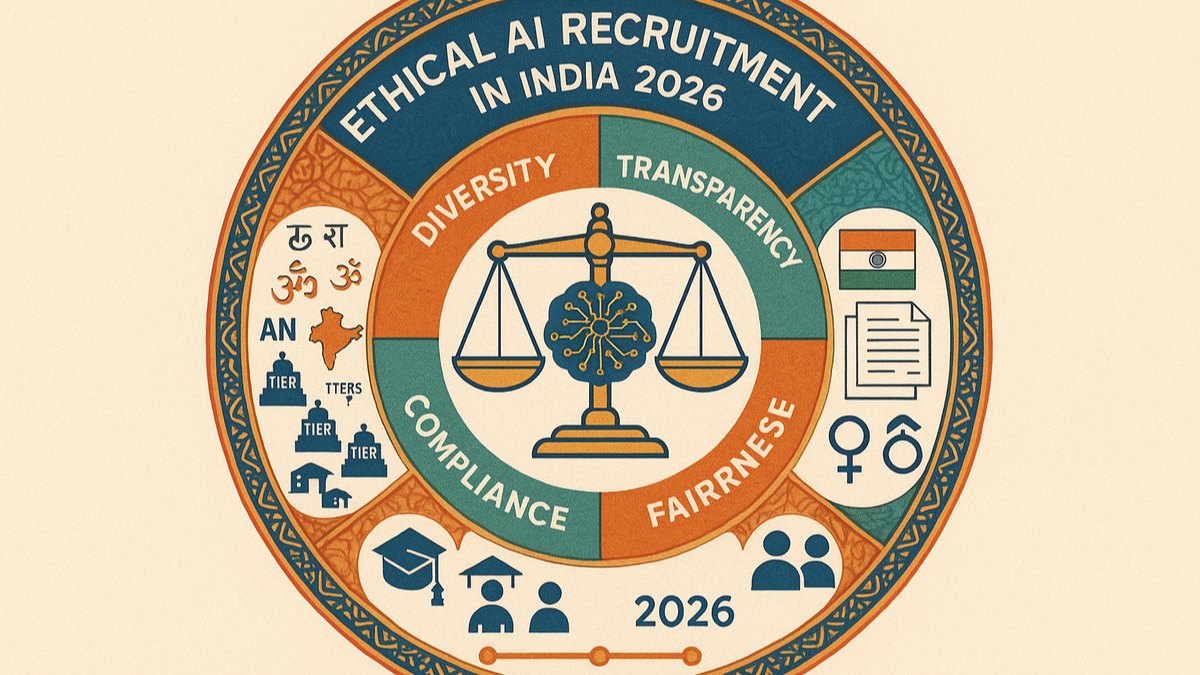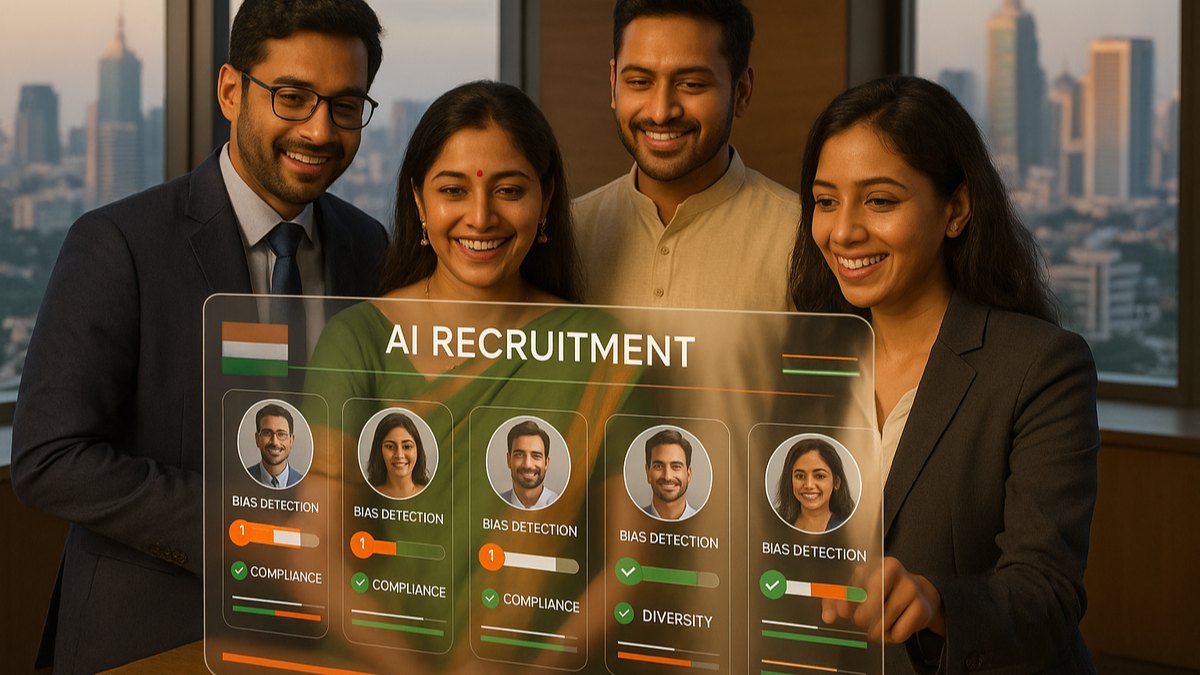Ethical AI in Recruitment 2026: India’s recruitment landscape is experiencing a technological revolution. As we advance toward 2026, ethical AI in recruitment has emerged as a critical concern for HR professionals across the nation. At Mahad Manpower India, we’re at the forefront of this transformation, helping organisations navigate the complex intersection of artificial intelligence, ethics, and compliance in the world’s largest democracy.
Ethical AI in Recruitment 2026: Are Your Practices Compliant
The Indian Context: Why Ethical AI Matters Now
Ethical AI in Recruitment 2026: India’s IT sector employs over 5 million professionals, with recruitment volumes reaching unprecedented levels. Major cities like Bangalore, Mumbai, Delhi, and Pune process millions of job applications annually. This massive scale makes AI adoption inevitable, but it also amplifies the risks of unethical practices. Ethical AI in Recruitment 2026 isn’t just about technology—it’s about ensuring fair opportunities for India’s diverse workforce spanning different castes, religions, languages, and socioeconomic backgrounds.
The stakes are particularly high in India, where employment can be transformative for entire families. A biased AI system doesn’t just affect individual candidates; it can perpetuate systemic inequalities across generations.
Critical Challenges in the Indian Recruitment Ecosystem

1. Language and Regional Bias
Ethical AI in Recruitment 2026: India’s linguistic diversity presents unique challenges for Ethical AI in Recruitment 2026. With 22 official languages and hundreds of dialects, AI systems trained primarily on English data may disadvantage qualified candidates from vernacular backgrounds. This bias extends to regional educational institutions, where prestigious IITs and IIMs might be favoured over equally competent regional colleges.
2. Socioeconomic Discrimination
AI algorithms may inadvertently discriminate based on indicators of economic status, such as:
- Email domains (personal vs. institutional)
- Address locations (urban vs. rural)
- Educational institution types (private vs. government)
- Extra-curricular activities that require financial resources
3. Gender and Cultural Biases
Despite progress, gender bias remains a concern. AI systems might penalise career gaps (often due to maternity or family responsibilities) or show preference based on names indicating gender or community. The challenge intensifies when dealing with transgender candidates or those from marginalised communities.
India’s Evolving Regulatory Framework
Current Legislation Impacting AI Recruitment
The Information Technology Act, 2000: While not AI-specific, it governs data usage and electronic records, directly impacting AI recruitment systems.
Personal Data Protection Bill: Once enacted, this will significantly impact how AI systems collect, process, and store candidate data.
Right to Equality (Articles 14-16): Constitutional provisions that prohibit discrimination in employment, applicable to AI-driven decisions.
Emerging Guidelines for 2026
The Indian government is developing comprehensive AI ethics guidelines, including: AI in recruitment 2026 trends.
- NITI Aayog’s National Strategy for AI
- Proposed AI regulatory framework by MeitY
- Sector-specific guidelines for IT and recruitment
Mahad Manpower’s Ethical AI Framework
1. Inclusive Data Training
To ensure Ethical AI in Recruitment 2026 compliance, we implement: AI in recruiting
- Multi-lingual training datasets covering major Indian languages
- Balanced representation from tier-1, tier-2, and tier-3 cities
- Diverse educational background inclusion
- Economic status neutralization techniques
2. Bias Detection and Mitigation
Our systematic approach includes:
- Regular audits for caste, religion, and regional biases
- Name-blind initial screening options
- Location-agnostic evaluation metrics
- Skill-based assessment prioritization
3. Transparency and Accountability
We believe candidates deserve clarity:
- Clear disclosure of AI usage in job postings
- Explainable AI decisions in vernacular languages
- Human review options for all candidates
- Detailed feedback mechanisms
Best Practices for Indian Organizations
For Employers
1. Diverse Hiring Teams: Ensure your AI oversight committee represents India’s diversity; include members from different regions, genders, and backgrounds.
2. Local Context Training: Train AI systems on India-specific scenarios, including:
- Different education systems (CBSE, State boards, ICSE)
- Varied career progression patterns
- Cultural nuances in communication styles
3. Regular Auditing: Conduct quarterly reviews examining:
- Success rates across different demographics
- Regional distribution of selected candidates
- Gender balance in shortlisting
- Representation of minority communities
For Recruitment Consultancies
1. Client Education: Help clients understand that Ethical AI in Recruitment 2026 is both a legal requirement and a competitive advantage.
2. Vendor Assessment: Choose AI tools that:
- Comply with Indian data protection laws
- Offer regional language support
- Provide transparency in decision-making
- Allow customization for Indian contexts
3. Continuous Monitoring: Track metrics such as:
- Diversity ratios in placements
- Candidate satisfaction scores across demographics
- Time-to-hire without compromising fairness
- Regional representation in successful placements
Implementation Roadmap for 2026 Compliance
Phase 1: Assessment (Immediate)
- Audit current AI tools for bias
- Review data collection practices
- Identify compliance gaps
- Establish baseline metrics
Phase 2: Planning (Q1 2025)
- Develop ethical AI policies
- Select compliant AI vendors
- Design training programmes.
- Create monitoring frameworks
Phase 3: Implementation (Q2-Q3 2025)
- Deploy bias-free AI systems
- Train HR teams on ethical practices
- Establish feedback mechanisms
- Launch pilot programmes.
Phase 4: Optimization (Q4 2025-2026)
- Refine based on feedback
- Scale successful practices
- Ensure ongoing compliance
- Build competitive advantage
The Business Case for Ethical AI
Organisations implementing ethical AI in recruitment in 2026 gain significant advantages:
Talent Pool Expansion: Access previously overlooked talented candidates from tier-2/3 cities
Employer Branding: Position as an inclusive, forward-thinking employer
Legal Protection: Avoid discrimination lawsuits and regulatory penalties ai recruiting laws
Innovation Boost: Diverse teams drive better business outcomes
Cost Efficiency: Reduced turnover through better candidate-job fit
Conclusion
Ethical AI in Recruitment 2026 represents a paradigm shift for Indian organisations. At Mahad Manpower India, we’re committed to leading this transformation, ensuring that AI enhances rather than hinders India’s promise of equal opportunity. As we serve clients across sectors, from IT giants in Bangalore to manufacturing hubs in Chennai, we recognise that ethical AI isn’t just about compliance; it’s about building an inclusive future where talent thrives regardless of background.
Ethical AI in Recruitment 2026: The journey toward ethical AI requires immediate action, sustained commitment, and continuous evolution. Organisations that embrace these principles today will not only meet 2026 compliance requirements but will also emerge as employers of choice in India’s competitive talent market.

